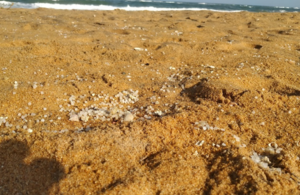UK Government marine experts to support Sri Lanka with X-press Pearl pollution response
Cefas scientists support Sri Lanka in response to X-press Pearl Pollution incident.

Following the X-Press Pearl container vessel fire that started in May and raged for 12 days, the UK Government is providing marine pollution expertise to help respond to the potentially devastating impact on the marine life and coastal habitats of Sri Lanka.
At the request of the Sri Lanka Government, the UK Government’s Centre for the Environment, Fisheries and Aquaculture Science (Cefas) will provide expertise and analytical capacity to support plastic pollution monitoring, as well as environmental and socioeconomic impact assessments. The team will partner with Sri Lanka Government Departments, academics and responsible authorities to support effective emergency response and implementation of a post spill integrated monitoring plan.
In the first instance, Cefas is working to assist in the laboratory analysis of post spill monitoring samples, particularly plastic pellets, and potential chemical contamination. From their UK laboratory in Lowestoft, the experts will work collaboratively with in-country teams to support understanding of expected consequences for key marine and coastal habitats and species, including mangroves, seagrass and coral reefs, as well as contributing to socioeconomic analysis to assess impacts on local communities and livelihoods.
Following the initial response, Cefas will continue to collaborate with the emergency response teams in Sri Lanka to provide guidance and training to build their expertise further for future incidents, with the aim of protecting biodiversity and safeguarding livelihoods, dependent on the marine environment. Work will also be done to assess the impact of the pollution on the surrounding area, by contributing to modelling to understand the dispersal of the pollutants, to help with short-term mitigation and clean-up action, as well as longer term risk prevention.
International Environment Minister, Lord Goldsmith said:
The X-Press Pearl vessel fire and the release of plastic pellets and chemicals along the Sri Lankan coast has already had devastating impacts, and it will likely cause long term harm to the environment, local fisheries and livelihoods.
I’m pleased that the UK is able to use its world-leading scientific expertise to advise on the clean-up effort and support plastic pollution monitoring. But this disaster again shines a light on the fragile nature of our marine environment.
We are determined to play our part in supporting developing countries to protect and restore their coastal ecosystems with our £500 million Blue Planet Fund launched at the G7 by the Prime Minister.
Director General of Ocean Affairs, Environment and Climate Change, Ministry of Foreign Relations of Sri Lanka, S. Hasanthi Urugodawatte Dissanayake, said:
Damage to the marine environment is a cause for concern for all those who are looking towards the oceans for the future progression of mankind. In this spirit of cooperation on environmental issues, Sri Lanka appreciates this initiative by the Government of UK offering assistance to understand the impact on marine environment, with opportunities for long term collaboration.
Cefas Marine Litter Scientist, Dr Umberto Binetti said:
Throughout the past weeks, we have been closely following the situation. We are concerned by the possible effects of the pollutants spilled from the vessel, not only on the environment, but also on local communities in Sri Lanka.
We are preparing a series of actions to provide support in monitoring the situation. Our UK laboratory is available to analyse samples collected by our in-country research partners and we stand ready to support Sri Lanka in understanding the serious environmental and socio-economic impact of this incident and possible mitigation measures.
For more information visit www.cefas.co.uk or follow @CefasGovUK. For UK media enquiries contact communications@cefas.co.uk or newsdesk@defra.gov.uk.